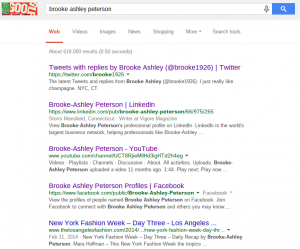Digital Footprint

I am so very thankful that I took the time to delete my Myspace, especially after seeing the results of this assignment. Upon Googling my full name (Brooke Ashley Peterson) I am pleased with the overall results; articles that I’ve written for various online publications, my Twitter handle, my YouTube account (which is home to one photo slideshow from a Hartford Courant photographer), my Facebook, and my LinkedIn account. All of these social media sites have been picked apart by me, and the privacy settings have been carefully scrutinized and customized. I wanted to make just enough of my life public so as to appear transparent.
That being said, I would rate my online footprint as good. I have a large social media following, and everything I would want to appear on the front page of Google is there. I think that your digital footprint reflects directly on your reputation as a journalist. On my own public Twitter I try to seem friendly, light-hearted, humorous, but also share a variety of news articles that interest me. I think, especially in the digital age, that seeming too professional or too unprofessional are both extremes that potential sources would not trust.
One complaint I have with my own virtual visibility is that I am the second most famous Brooke Peterson. Which, to me, is meaningless. But to the Google search engine is fairly important. Searching the name “Brooke Peterson” gives me very different results than “Brooke Ashley Peterson” because there’s a relatively famous chef with the same name as me. I don’t even show up on the first page of Google when I search for myself without my middle name. When I first started writing for online publications using my middle name, I only did so because I thought it sounded better. I can now give 17 year old Brooke a pat on the back for narrowing our Google search.
Audience Engagement
“Journalists are expected to be conversation leaders and moderators, and not just “broadcasters” of information.”
Though I believe that this notion has evolved with the digital age (via comment sections and forums) I think that journalists have always been conversation leaders and moderators. Even in newspapers, it is at the journalist’s discretion to pick and choose what news is relevant or important, and not to just broadcast all of it at once. That being said, I am in support of the new developments being made in this area. Social media platforms like Facebook, Twitter and Instagram are designed for people to share information with each other and allow it to spread more rapidly to others. With my social media following, I can engage with my followers and begin conversations that lead to helping people obtain a better understanding of whichever topic I posted about. Creating conversation sparks new ideas and helps to educate and disperse information, which is exactly a journalist’s job. I find that when I post something controversial, people like to jump in and give me their opinion on it.
One negative aspect that I’ve found with this online interface is the bias in what I write. I am especially guilty of it because Twitter and Facebook are such casual environments, but at the end of the day you must remain professional in what you write and how you write it. I’ve definitely experienced what it’s like to post a link that I thought would create a conversation, and instead it leads to a very pointless internet fight. According to The Trust Project, “Media credibility has been a challenge for decades and is far more so today.” I think this is a very true statement, and it’s only going to become more difficult as technology evolves and expands. The expansion of the internet is somewhat scary, that’s for sure. Readers are looking to become more involved in the stories they read and therefore is the responsibility of the journalist to maintain a professional yet engaging online presence.